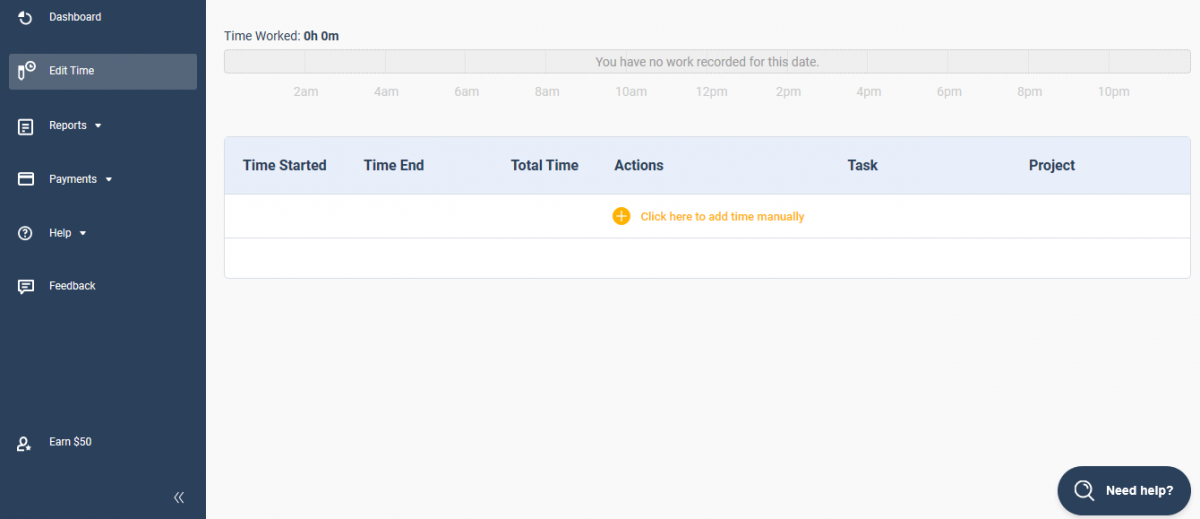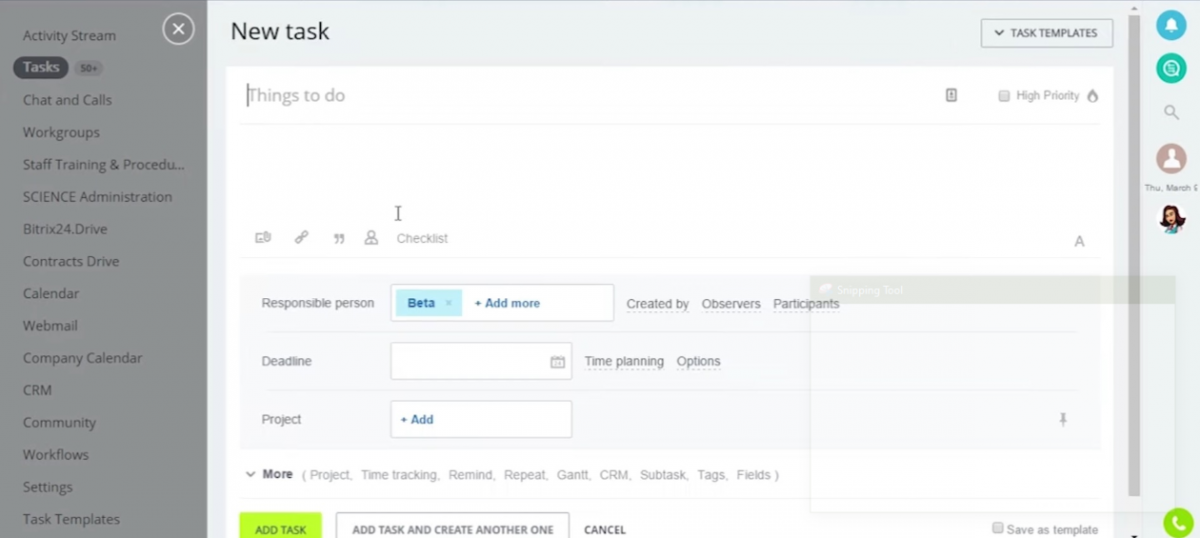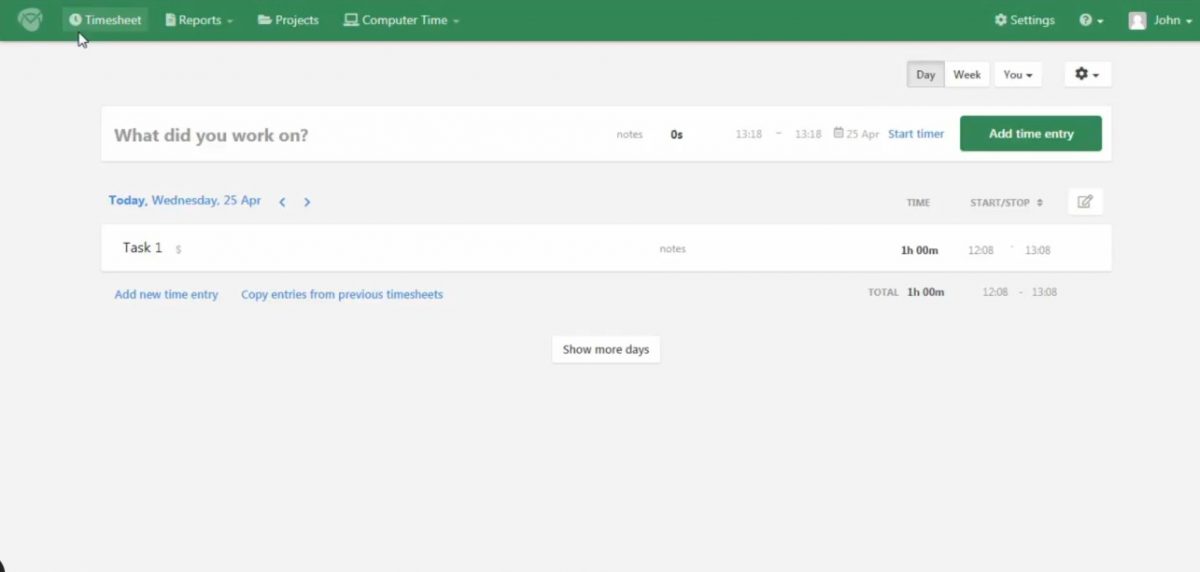Getting everyone to log their time manually can sometimes feel like playing a broken record, which at some point, repeats itself again and again. The worst part is no matter how many times you require everyone to track the time they spend on each task; guesswork still finds its way to your processes at the end of the day.
This is where a time tracking software comes handy. It helps you capture work hours accurately, monitor employee performance, set and respect deadlines, and give every task the attention it deserves. Not to mention that time trackers and productivity tools can improve your profitability by 30%.
But how exactly does a time tracking software work?
To answer that, we prepared this buyer’s guide, where you can find all the important aspects of a time tracking software. We’ll discuss its benefits, key features, and other things to consider when buying one.
What Is Time Tracking Software?
A time tracking software is a tool used by employees and managers to track and record billable hours. It captures the time spent on tasks and projects and allows you to set targets and deadlines. You can also use this tool to have a complete view of your project’s progress and spot workplace issues affecting employee productivity.
This piece of software is also used to ensure that tasks and projects are completed on time. Regardless of your project or team’s size, there are lots of suitable time tracking platforms that you can choose from. You can learn more about its key features, benefits, and other important details below.

Time Doctor helps you record work hours accurately.
List of Best Time Tracking Software
Statistics show that only 20% of the average work hours are used for crucial tasks. A time tracking software ensures that your team is always on the right track to finishing important projects. To have a complete picture of how this piece of software works, let’s take a look at some of the examples below.
- Time Doctor. Time Doctor is a time tracking software that allows employees to record their work hours in real-time. It provides a breakdown of time usage per client, project, or task. Pricing starts at $12/user/month.
- Hubstaff. Hubstaff offers online timesheets, payroll, and invoicing. It lets you in on each employee’s activity levels and schedules. The vendor offers a free version of the software.
- TimeCamp. TimeCamp combines a unique blend of time tracking, billing, and invoicing. It comes with an online timer that records time spent on assigned tasks, allowing you to come up with accurate timesheet data for employee payroll. The software is available at no cost.
- TimeSolv Pro. TimeSolv Pro is a web-based time tracking and billing software that has specialized features for your business. It runs seamlessly on PC, Mac, iOS, and Android devices. It costs $19.95/user/month.
- Bitrix24. Bitrix24 is a task management tool that offers Gantt charts, Kanban boards, and time tracking. It also has advanced project planning tools to help you complete projects on time.
- Harvest. Harvest is an online time tracking tool that allows you to capture the time spent on specific clients, projects, and tasks. The software is available for free, but a Pro version with more additional features costs $12/person/month.
- Wrike. Wrike has a time tracker tool that lets you keep track of your time by using an automated task timer or by adding manual timelog entries. Pricing starts at $9.80/user/month.
- TimeLive. TimeLive is a web-based time-keeping software that offers timesheet tools to help you manage your projects smartly. It helps you track your employees’ working hours and expenses efficiently and accurately. Pricing starts at $3/user/month.
- Jibble. Jibble offers time and attendance tracking to help you monitor and improve your team’s productivity. It has daily, weekly, and monthly timesheets you can use in your payroll review. You can use the free version of the software or avail its plans ranging from $1.50/active user/month to $3/active user/month.
- Clockify. Clockify is a time tracking software that offers timesheet and time tracker tools, allowing you to monitor your team’s work hours. The software is available for free.
- Toggl. Toggl helps you improve your team’s productivity with its timers and tracking reminders. It also has reporting features, project dashboards, and billing tools. To avail the software, you can choose pricing plans ranging from $9/user/month to $18/user/month.
- Timecamp. Timecamp is a fully automated time tracking and task management solution that allows you to manage your team’s work hours and assign them to their corresponding projects. The software offers a free version and several priced plans starting at $5.25/user/month.
- Tsheets. Tsheets streamlines team management processes with its time tracking and employee scheduling tools. It gives you a complete view of your projects and provides reporting tools to help you gain valuable insights. Pricing starts at $8/user/month.
- MyHours. MyHours is another time tracker application that lets you record work hours, bill clients, and generate reports. The software works on both Android and iOS devices. You can use MyHours for free, or you can avail the Pro plan priced $6/active team member.
- Ebillity. Ebility combines time tracking, payroll, billing, and productivity tools in one platform to streamline timekeeping and payroll processes. The vendor offers several pricing plans ranging from $4/user/month to $12/user/month.
- TMetric. TMetric is a comprehensive platform that tracks time, monitors employees’ digital activities, and tracks work performance. Made for businesses of various scales, it can also be used to monitor attendance. The software has a free plan and two paid plans, priced at $5/month and $7/month, respectively.
- Buddy Punch. Buddy Punch is an employee time tracking software that optimizes payroll management with its online punch clock. It also has automated timesheets that remove time-consuming paper timesheets and eliminate messy calculations. For monthly plans, pricing starts at $29.99 per month. Meanwhile, the same plan is priced at $25.99 per month when you subscribe to an annual plan.
- factoTime. An employee time and attendance tracking tool that helps to manage employees’ working hours, attendance- leave, and calculate the payroll automatically. With the help of this data, the tool allows the manager to download a comprehensive report of the employee’s activity. The tool works on a desktop as well as android and iOS devices. The tool offers free and paid-price plans. The paid plan starts at 0.99$ per month, per user.
- WebWork Time Tracker. An all-in-one tool that offers time tracking, task management and chatting in one place. It also has other features such as attendance tracking, billable hours, invoice creation and many more. WebWork has a 14-day free trial and costs $2.99 per user/month.
Need more tools to consider? Here’s another one:
- EmailAnalytics: This app is a unique type of time tracking software. It enables you to visualize and monitor email activity for yourself or your employees, which is a great way to see how you or your employees spend their time while using email. It calculates critical KPIs like average email response time and sends you a daily email report to monitor activity right from your inbox.
Benefits of Time Tracking Software
As simple as it may sound, time tracking is not merely monitoring your employee’s work hours. It does a great deal more than that. It lets you in on your team’s performance and gives you a complete view of each task or project’s progress. The truth is there are several benefits to time tracking—and using one can improve your productivity and business efficiency.
Performance reviews
Businesses often make the mistake of relying on time as the sole factor of judging an employee’s performance. What a time tracking software does is eliminate the guesswork in performance reviews and give you the actual data on each employee’s productivity. Sharing this performance data with your team can also help them identify weaknesses to work on and strengths to further improve.
Data resource
Aside from capturing individual employees’ time records, time tracking software provides a vast data resource for companies. With analytics and reporting as its key features, it offers valuable data in manpower and resources, allowing you to make strategic business decisions in the future.
Completing projects on time
Time-tracking software can help you foresee how long it will take to complete a certain project. This prevents those worst-case scenarios: missing deadlines or overworking your team to catch up to your delivery time. By spotting consistent patterns in different project types, you can adjust schedules and resources to a more realistic timeframe.
Key Features of Time Tracking Software
So, you’ve decided to purchase a time tracking software for your company. The only problem is this: with so many time tracking software out there, how do you know which one would give you more value for your money? Below, we made a list of essential features and components that you need to look out for when picking a time tracking software.
Task segmentation
A good time tracking software allows you to segment projects into individual tasks, calculated in hours or units. It should also enable you to set the exact starting and ending points for each task. This helps you keep track of assigned tasks and ensure that employees are meeting their deadlines.
Time tracking
This is the core feature of all time tracking tools. It should accurately capture the number of hours spent on a task and provide employee’s time records when you need them. Some time tracker tools track real-time tasks right from your computer, while others record time in automated timesheets.
Analytics and reporting
Gathering data about your team’s performance and the progress of your projects is one of the key benefits of time tracking software. While most tools have this feature, not all of them have the key metrics that you need. Choose one that offers comprehensive reporting tools. Aside from daily and weekly reports, some platforms offer web and app usage, task and client breakdowns, and detailed usage stats.
Payroll
With a payroll system in place, you can easily pull up the billable hours for each employee and automatically calculate them right from the platform. Time tracking tools typically use two methods to calculate payroll accurately. It’s either based on fixed salaries or the number of hours that the software captured. This is why about 48% of companies rely on time tracking tools for accurate payroll reports. With this feature, you can manage employee pay and client billing easily.
Integrations
Unless you’ve found a platform that covers all your business functions, it won’t hurt to consider the integrations offered by a time tracking software. CRM, HR, and payroll systems are usually the ones you need to integrate your tracker with, or else, you’ll be wasting time entering data from one system into another.
Mobile-friendliness
A mobile version of a time tracker tool would be great to keep your schedules with you wherever you work. This comes especially helpful when you have a team that needs to work remotely. Instead of guessing the number of hours they worked on specific tasks, they can access the time tracker tool from their phones.

Bitrix24 offers comprehensive task management features.
Types of Time Tracking Software
Industry experts categorized time tracking software into two: timesheet and time tracking/recording.
Timesheet
This type of time tracking allows users to enter tasks and work hours into the timesheet application. To do this, the first step is to fill the work log with the start and endpoints of a certain task. Then the employee submits it to the manager for approval. Once the timesheet is approved, it will be forwarded to the HR and processed for payroll.
Time tracking/recording
This type of time tracker captures work hours in real-time. The moment employees start their shift, all they need to do is enable the time tracker from their computers, and the system automatically records work-related activities. After their shift, turning off the tracker stops the time recording function.
Note that while some time tracking software platforms are standalone systems, others are integrated and have more functions, such as project and task management, payroll, billing, and invoicing.

TimeCamp allows you to set start and endpoints for each task.
Latest Trends
Keeping tabs on the latest trends and developments can give you a competitive advantage in your respective industry. In this case, employee behavior and technological developments can guide you in making strategic decisions for your company. The following are some key trends you need to watch out for:
Remote work options
Statistics revealed that about 9.8% of companies have remote workers, a figure that’s expected to rise in the coming years. With the increased number of employers now given remote work options, time tracking platforms also see increased demand from various industries. The rise of remote workers underlines the importance of using a time tracking tool. With time tracking software, employees and managers can be organized no matter where they work from.
Time tracking tools as employee self-service portals
As employees recognize the need to connect with employees, time tracking apps now start to offer self-service portals that would allow employers and managers to communicate directly from the platform. For instance, mobile-friendly tools would help employees share work-related information at any given time. They can take their schedules with them, check PTO balances, and sign off from timesheets right from their mobile phones.
Potential Issues
A perfect solution to your time tracking needs would be ideal, but let’s be real: some systems are flawed, and others may not have enough features to cover your unique business needs. Some issues you need to look out for include the following:
Manual and automated time tracking
When picking out your first time tracking software, the first thing to figure out is, of course, how it tracks time. The problem is, some software vendors smartly avoid mentioning if their tracker is automated or manual. You don’t want to make the mistake of setting a time tracker, thinking it’s automatically recording work hours when in reality, it does nothing but let you input time manually. To prevent this, you can always make use of the free trials to get up to speed with the software features.
Inclusions of free platforms
One of the best things about this software category is that you can find many time tracking software vendors that offer their products for free. However, free versions usually have limited functionalities and capabilities, so you may still need to pay for any additional tools. Instead of saving up, you might find yourself actually spending more for the extra features. In that case, you’re better off with a good platform that has affordable pricing plans.
Things to Consider When Buying Time Tracking Software
There’s no one-size-fits-all platform, so there’s a good chance that some time tracking tools lack certain functionalities that you need. Below is a list of factors to consider when buying a time tracking software:
Scalability
Thinking two steps ahead wouldn’t hurt, so when choosing a time tracking software, a scalable system is the most ideal. While using a limited platform to cover only the basic needs of your company is a great way to save money, this could backfire when your business grows, and you would need more automated functions. This only leaves you with the option of ditching your current system and moving to another one. Years of data would be lost, and you’ll have to start from scratch. To prevent this from happening, carefully check out each software’s inclusions and see if the vendor offers upgrading options or add-on tools.
Pricing
Time tracking platforms usually cost somewhere between $50 and $1,500. The pricing depends mostly on the number of licenses you need to purchase. In general, plans are inclusive of timesheets/time tracker, monitoring tools, analytics, and reporting.
Device compatibility
Some time tracking software solutions are built with specific devices in mind, and it’s important to consider that when buying one. Most tools are compatible with Windows computers, while others are designed for Mac, iOS, and Android devices.
